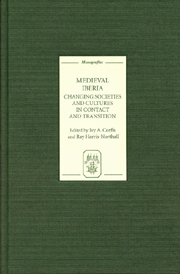Book contents
- Frontmatter
- Contents
- Acknowledgements
- Introduction
- Part 1 SOCIAL AND CULTURAL MINORITIES IN CHANGING SOCIETIES
- The Converso Condition: New Approaches to an Old Question
- Speaking through Many Voices: Polyphony in the Writings of Teresa de Cartagena
- Chains of Iron, Gold and Devotion: Images of Earthly and Divine Justice in the Memorias of Doña Leonor López de Córdoba
- Part 2 CONTACT AND CONFLICT: PERSPECTIVES ON HISTORY AND CULTURE
- Part 3 TRANSMISSION OF LEARNING AND TEXTS IN CHANGING CULTURES
- Part 4 LINGUISTIC CONTACT AND CHANGE
- Index
The Converso Condition: New Approaches to an Old Question
from Part 1 - SOCIAL AND CULTURAL MINORITIES IN CHANGING SOCIETIES
Published online by Cambridge University Press: 12 September 2012
- Frontmatter
- Contents
- Acknowledgements
- Introduction
- Part 1 SOCIAL AND CULTURAL MINORITIES IN CHANGING SOCIETIES
- The Converso Condition: New Approaches to an Old Question
- Speaking through Many Voices: Polyphony in the Writings of Teresa de Cartagena
- Chains of Iron, Gold and Devotion: Images of Earthly and Divine Justice in the Memorias of Doña Leonor López de Córdoba
- Part 2 CONTACT AND CONFLICT: PERSPECTIVES ON HISTORY AND CULTURE
- Part 3 TRANSMISSION OF LEARNING AND TEXTS IN CHANGING CULTURES
- Part 4 LINGUISTIC CONTACT AND CHANGE
- Index
Summary
Post-colonial theory focuses on the problem of cultural representation and the consequent manner in which human subjects become protagonists of consciousness. In particular, it takes into consideration cultural hybridities, especially those circumstances where individuals struggle to define themselves as subjects along the frontiers of cultures in contact, paying special heed to the need of human subjects continually to renegotiate their social position in terms of constantly changing synergies of power. The fields of cultural history, as well as the ethnography of communication (e.g., studies by Geertz and Darnton), offer numerous possibilities for refocusing, nuancing and problematizing our understanding of the existence of the conversos in pre-Expulsion Castile; and by extension, for deepening our knowledge of the exchanges between late medieval Iberian ethnicities and the processes of their transculturation. Indeed, scholars of the Iberian medieval past will no doubt recognize the affinities between contemporary post-colonial studies and the work of Spanish cultural critics and historians like Castro, Caro Baroja and Domínguez Ortiz, as well as most of their immediate successors on both sides of the Atlantic, all of whom sought to explore avant la lettre many of the issues that are at the center of the current postcolonial research agenda. Hence, for Hispanists, reading the post-colonial critics today often produces a sense of déjà vu.
Yet despite the similarities and points of recognition, contemporary postcolonial theory and practice offers Hispanic Studies important suggestions for ways both to broaden and nuance – refocus and problematize – the multicultural domain of the Hispano-medieval world.
- Type
- Chapter
- Information
- Medieval IberiaChanging Societies and Cultures in Contact and Transition, pp. 3 - 15Publisher: Boydell & BrewerPrint publication year: 2007



